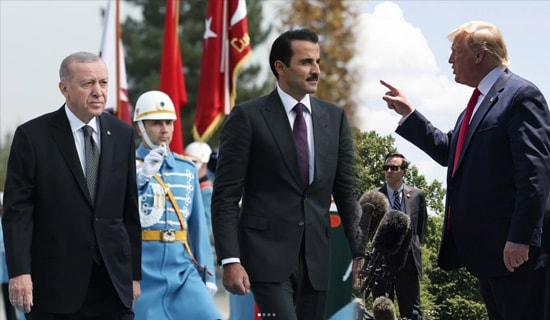
Pakistan Army chief General Ashfaq Parvez Kayani presiding over the 139th Corps Commanders’ Conference in Rawalpindi on June 9, 2011
On June 9, 2011, a conference of the Pakistan Army’s Corps Commanders was held at the General Headquarters of the Pakistani military in Rawalpindi. Pakistan Army chief General Ashfaq Kayani briefed the commanders about the overall security situation facing Pakistan, as well as about military-to-military relations between Pakistan and the U.S. and intelligence cooperation between the two allies in the war on terror.
After the conference, the Inter-Services Public Relations (ISPR) department of the Pakistan military issued a lengthy statement regarding the issues discussed at the conference. The statement, numbered PR134/2011-ISPR and dated June 9, 2011, noted that the Pakistani military has carried out a reassessment of Pakistan-U.S. bilateral relations in the wake of the unilateral U.S. operation in Abbottabad that killed Al-Qaeda leader Osama bin Laden.
It noted three important points: all intelligence sharing between Pakistan and the U.S. will from now onwards be on the basis of reciprocity; the Pakistani army has sharply cut down the number of U.S. military personnel stationed in Pakistan; and the U.S. drone attacks on militant sanctuaries in the Pakistani tribal region are unacceptable and in this regard Pakistani government is taking measures with the U.S.
The statement also clarified that the most of the U.S. funds meant for Pakistani military are actually used by the civilian government for the common people. According to the statement, General Kayani recommended to the government to utilize U.S. funds meant for the Pakistani military for the economic uplift of the common man. General Kayani also asked the people in North Waziristan to expel "foreigners" – a reference to non-Pakistani militants. The statement was silent on whether General Kayani said anything about the Pakistani militants.
Following is the text of the statement:[1]
"The Participants Were Given a Comprehensive Briefing with Special Reference to Internal Security, Terrorism, Role of the Media, the Society…, and Military-to-Military Relationship With the U.S…"
"[The] 139th Corps Commanders Conference was held at the GHQ [General Headquarters of Pakistan Army in Rawalpindi] on 9th June 2011. COAS [Chief of Army Staff] General Ashfaq Parvez Kayani chaired the meeting. The participants were given a comprehensive briefing with special reference to internal security, terrorism, role of the media, the society, and all organs of the state to comprehensively address the ongoing challenges that the country faces, and military to military relationship with the U.S…"
"[General Kayani] also apprised the… [participants] about his interaction with various foreign visitors, military as well as civilian, who met him after the Abbotabad incident.
"While reviewing the internal security situation, the participants voiced their concern on the blowback of the Abbottabad incident [i.e. the unilateral U.S. operation that killed Osama bin Laden] which has resulted in the upsurge in terrorism and consequent loss of innocent lives. It was concluded that all law enforcement agencies, though trying their best to cope with the situation, need to be more focused and proactive and Army will be there to extend all possible support.
"The participants noted with regret that despite [the Pakistani military’s Inter-Services Intelligence chief Lt.-Gen. Shuja Pasha] briefing the joint session of the parliament and deferring the ultimate findings to the commission appointed by the government, some quarters, because of their perceptual biases, were trying to deliberately run down the armed forces and army in particular [over the Abbottabad operation]. This is an effort to drive a wedge between the army, different organs of the state and more seriously, the people of Pakistan whose support the army has always considered vital for its operations against terrorists…"
"[General Kayani said] That the Military-to-Military Relationship With the U.S… Had to Be Assessed Afresh In Light Of [the Abbottabad Operation]; [The] Army Has Drastically Cut the Strength of U.S. Troops Stationed in Pakistan"
"[General Kayani] noted that in order to confront the present challenges, it is critical to stand united as a nation. Any effort to create divisions between important institutions of the country is not in our national interest. The participants agreed that all of us should take cognizance of this unfortunate trend and put an end to it.
"The [corps commanders were] informed by… [General Kayani] that military-to-military relationship with the U.S. has to be viewed within the larger ambit of bilateral relations between the two countries. It had to be assessed afresh in light of the 2nd May incident [i.e. the Abbottabad operation] as well as the dictates of the Joint Parliamentary Resolution passed on 14th May 2011. In this regard, aspirations of the people of Pakistan also need to be taken into account.
"In line with the demands of these important factors, [the] army has drastically cut down the strength of U.S. troops stationed in Pakistan. It needs to be clarified that [the] army had never accepted any training assistance from the U.S. except for training on the newly inducted weapons and some training assistance for the [Pakistani paramilitary force] Frontier Corps only. Even that has ceased now."
"It Has Been Decided to Share Intelligence [With the U.S.] Strictly on the Basis of Reciprocity; [General Kayani] Called Upon the Brave People of… [North Waziristan] to Evict All Foreigners [i.e. Foreign Militants] from Their Soil"
"The… [corps commanders were] informed by… [General Kayani] that economic rather than military aid was more essential for Pakistan. In line with the position taken in Pak-U.S. strategic dialogue in Mar[ch] 2010, it is being recommended to the government that the U.S. funds meant for military assistance to army be diverted towards economic aid to Pakistan which can be used for reducing the burden on the common man. Paying tributes to the resilience and sacrifices of valiant people of Pakistan, the participants assured the nation that the army will do its utmost and continue to sacrifice for the security and well being of the people.
"The participants were also informed about the extent of intelligence cooperation with the U.S. It has been decided to share intelligence strictly on the basis of reciprocity and complete transparency. It has been clearly put across to U.S. intelligence officials that no intelligence agency can be allowed to carry out independent operation on our soil.
"News about military operations in… [North Waziristan, the militant safe haven] also came under discussion… [General Kayani] informed the participants that the army was following a well thought out campaign plan and is under no pressure to carry out operations at a particular time. Future operations, as and when undertaken, will be with political consensus.
"He, however, called upon the brave people of… [North Waziristan] to evict all foreigners [i.e. foreign militants] from their soil and take charge of their land and destiny once again. He emphasized that it was wrong, in principle, to allow others to use our land for fighting their battles. This must not be allowed. The army in… [North Waziristan] is committed to supporting the people of… [North Waziristan] in this effort."
"As Far As Drone Attacks are Concerned, the Army Has Repeatedly Conveyed… That These Are Not Acceptable Under Any Circumstances; The Government is Making Necessary Efforts in This Direction"
"As far as drone attacks are concerned, the army has repeatedly conveyed to all concerned that these are not acceptable under any circumstances. There is no room for ambiguity in this regard. The government is making necessary efforts in this direction…"
"[General Kayani] also informed the… [corps commanders] that the often quoted figure of U.S. $13-15 billion utilized by the army in last 10 years is misplaced. Under the head of Coalition Support Fund (CSF), against a total sum of U.S. $13 billion expected from the U.S., only U.S. $8.6 billion have been received by the government of Pakistan. The government has further made available only U.S. $1.4 billion to the army over last 10 years. A relatively smaller amount has gone to navy and PAF [Pakistan Air Force] as well.
"The rest, i.e. approximately U.S. $6 billion, has been utilized by the government of Pakistan for budgetary support, which ultimately means the people of Pakistan (The figures quoted here have been reconciled with the Ministry of Finance)."
"[Pakistani Troops] are Putting Their Lives on the Line For the Noble Cause of Defending Their Motherland – Nothing Should Distract Them From the Job at Hand; Their Reward Lay in the Hands of Almighty Allah"
"Participants of the Conference voiced extreme respect and appreciation for the sacrifices rendered by the troops for the security of the country. They are putting their lives on the line for the noble cause of defending their motherland. Nothing should distract them from the job at hand. Their reward lay in the hands of Almighty Allah and in the prayers of people of Pakistan.
"The participants paid special tributes to the Shuhada [martyrs], their families and the children. They reiterated their resolve to complete their mission and secure future of Pakistan, which undoubtedly lies in an Islamic Republic with a tolerant society in the true spirit of Islam, having no room for terrorism.
"Pakistan’s internal situation is the most important factor and it cannot be relegated in priority. [The] army leadership reaffirmed its resolve to continue supporting the democratic system without any preference to any particular political party. It is also determined to lead the fight on terror in partnership with other law enforcement agencies and in line with the [Pakistani] Constitution."
[1] www.ispr.gov.pk, Pakistan, June 9, 2011. The text of the statement has been lightly edited for clarity.




.jpg)